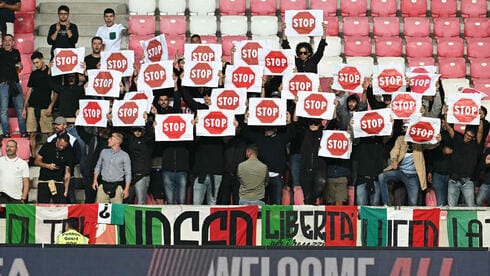Italy’s victory over Israel eliminates them from World Cup - it is now time to strip Israel of its sporting privileges everywhere

On Tuesday, Italy emphatically beat Israel 3–0 in Udine in a World Cup qualifying match played under heavy security and the shadow of mass protests. The result effectively ended Israel’s realistic chance to qualify for the 2026 World Cup: Italy’s win left Israel unable to catch the Azzurri in the group table, removing them from contention for the finals. The match was not just a sporting defeat - it was another public demonstration that Israeli sport now finds itself isolated because of the country’s conduct in Gaza and The West Bank.

The political atmosphere surrounding the game
The context matters. Pro-Palestinian rallies filled the streets of Udine in the build-up to the fixture; images and eyewitness reports showed protesters demanding that Israel be “shown the red card” and excluded from international sport. Inside the stadium the atmosphere was raw - boos during the Israeli anthem, greatly reduced attendance, and extraordinary security measures including snipers and heavy policing. These weren’t isolated expressions of passion: they reflected growing global revulsion at the humanitarian toll in Gaza and the mounting pressure on sporting bodies to act. Al Jazeera’s coverage showed how these protests were organised and highly visible in the lead-up.

Accusations of player misconduct and verbal abuse
This game also reopened a can of worms about the conduct of players on the pitch, and what could lead to disciplinary measures, now or in the future. Israeli team members say Italian players “cursed at us the whole game” and directed insults at them during their earlier September match in the same qualifying group - an allegation that sparked confrontations after the whistle and has added heat to an already politically charged campaign. Whether the insults were personal or political, the episode demonstrates how international football has become a theatre for the Israeli state’s contested conduct, and how ordinary sporting rituals have been contaminated by the campaign of genocide.

Moral imperatives: why Israel should face suspension
But the headlines and the on-pitch rows are symptoms, not causes. The central question is moral: should a state accused by UN experts of systematic human-rights violations continue to enjoy the privileges of international sport? In recent months UN human-rights experts explicitly called for suspension of Israel from international football amid the unfolding crisis in Gaza. Civil society groups and rights organisations have relentlessly urged FIFA, UEFA and the IOC to do what they did with Russia - use sport as leverage, send a clear message, and refuse normalisation.
1. Sporting bodies have precedent and responsibility
Sport is never purely “apolitical.” FIFA, UEFA and the IOC have applied bans before when political actors committed grave breaches - most visibly in the response to Russia’s invasion of Ukraine. The ethical inconsistency in treating Israel differently weakens sport’s moral authority and makes governing bodies look complicit in a double standard. If sporting organisations claim to uphold values - human rights, dignity, non-discrimination - they must apply those values consistently.
2. Normalisation through competition legitimises conduct
Continuing to allow Israel to compete normalises and sanitises state conduct. Allowing teams and athletes carrying a state’s colours to parade at international fixtures conveys tacit acceptance. For Palestinians and their supporters worldwide it feels like an endorsement while Gaza’s hospitals, schools, and cities lie in ruins. Boycotts and suspensions aren’t symbolic only - they are practical levers of political and economic pressure that have historically helped shift behaviour when diplomacy failed.
3. Safety, integrity, and viability at stake
Safety and integrity of sport are at risk. The Udine fixture illustrated that hosting Israel can place host cities in turmoil, requiring extreme security and jeopardising public order. It foreignises matches (tickets withheld from visiting fans, stadiums emptied), undermines the spirit of fair competition, and turns fixtures into flashpoints for violence and protest. When the matchday experience and player conduct are compromised at scale, the governing bodies must weigh whether participation itself is compatible with the stated aims of international sport.
The illusion of sporting neutrality
Those who argue for “sporting neutrality” must confront reality: neutrality has historically sided with the powerful. The decision not to act in cases of grave abuses becomes an action in itself - it shields perpetrators from consequences. The only credible route for sporting authorities that want to be consistent with their own charters is a temporary suspension contingent on meaningful, verifiable improvements in Israeli policy toward Palestinians. This could include measures tied to ceasefire implementation, humanitarian access, accountability mechanisms, and cooperation with independent investigations.

Growing pressure, global campaigns, and what comes next
Civil society has not waited. Campaigns urging FIFA and UEFA to suspend Israel - from grassroots groups to prominent UN experts - have multiplied this year. Activists argue that suspension should be immediate and unconditional until Israel ends the policies and operations that have produced catastrophic civilian harm. The pressure is building not just on football’s administrators but on sponsors, broadcasters and national federations to stop treating sport as if nothing is wrong.
If sport truly stands for humanity, equality and fair play, international football must do more than schedule fixtures and sell tickets. It must take a position that affirms human dignity. The Italy-Israel match in Udine was not merely a sporting result - it was a public referendum on whether the world’s stadiums will be moral bystanders or instruments of accountability. The right answer is clear: unless and until Israel’s actions meet basic international standards, the country should be suspended from international sporting competitions. Anything less is complicity by omission.
